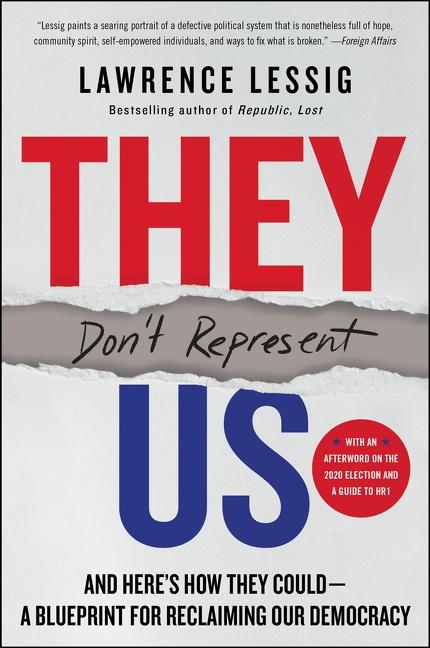 Today we welcome a guest blog post from Lawrence Lessig, author of They Don't Represent Us, on the day of the paperback release. They Don't Represent Us argues with insight and urgency that our democracy no longer represents us and shows that reform is both necessary and possible. The paperback includes a new afterword about the 2020 election as well as a guide to HR1, the major voting rights bill currently in the Senate.
Today we welcome a guest blog post from Lawrence Lessig, author of They Don't Represent Us, on the day of the paperback release. They Don't Represent Us argues with insight and urgency that our democracy no longer represents us and shows that reform is both necessary and possible. The paperback includes a new afterword about the 2020 election as well as a guide to HR1, the major voting rights bill currently in the Senate.
There's so much praise for They Don't Represent Us, including:
“Lessig is a modern-day Paul Revere with a warning we must heed: Our representative democracy no longer represents us…. This urgent book offers not only a clear-eyed explanation of the forces that broke our politics, but a thoughtful and, yes, patriotic vision of how we create a government that’s truly by and for the people.”
—David Daley, bestselling author of Ratf**ked and Unrigged
“An impassioned call to all Americans to fight for equal representation.”
—Kirkus Reviews
“A thoughtful, illuminating, nonpartisan, and pragmatic analysis of the changes needed to restore power to the public… this a must-read and a much-needed wake up call.”
—Booklist
Now, a note from Lawrence:
***
“There are a thousand hacking at the branches of evil,” wrote Henry David Thoreau, “to one who is striking at the root.” What is, for us, and for our democracy, that root?
In this book, I show how a single idea explains the rest. That a core promise of any democracy — that it be “representative” — is broken by the institutions of our democracy. Whether through gerrymandering, the suppression of the vote, the Electoral College, the Senate, or, certainly most extremely, the way money dominates the attention of politicians, we have allowed this, “the greatest democracy in the world,” as our leaders style it, to be corrupted because we have allowed this democracy to become radically unrepresentative.
And not just our government: even worse, we have allowed us, the people, to become unrepresentative. “We, the People” speak in our democracy. But how we get rendered, by the institutions of modern media, is deeply unrepresentative as well.
This point, I fear, most are missing. For much of human history, “the people” were invisible, because, for most of human history, there was no such thing as scientific polling. Polling was born less than a century ago, and when it grew up, we were living in a historically strange media environment. From roughly the middle of the 1950s through the middle of the 1980s, we lived within, as Princeton political scientist Marcus Prior names it, a “broadcast democracy,” where most were focused on a common story, grounded in a common set of facts. That point of view was not unbiased, or even necessarily true, but it made democracy possible in the age of a legible public.
That common ground has fallen away. And not just through accident, or temporarily. Rather, as I argue in this book, the business model of modern media, from cable television to the dominant Internet platforms, is set against the nurturing of any common ground. Instead, our media profits the more they render us as crazy. The business model of hate is not just what politicians do. Rather in the details of the incentives that make modern media profitable, they profit more the more they tribalize us.
That argument seemed clear enough to me when this book was first published in November 2019. Everything that has happened since only confirms its worst fears. Not surprisingly, the first Impeachment of President Trump got rendered in a tribal way. But astonishingly, even to me, so too did a global pandemic, and then the reporting and understanding of whether a clear and certain presidential election had in fact been “stolen.”
History will look back at us and wonder how this was possible. I am proud to look back at this book and to see in it the first answers to that question. We have an extraordinary challenge before us, not just to render them—the government—representative if not again, then for the first time, but also, and more difficultly, us.
How they get fixed is easier to see. The “For the People Act,” aka HR1, now being considered in the Senate, and summarized in an appendix to this edition, would be a critical first step. How we get fixed, or more precisely, how we fix how we get represented, is a much greater challenge. First steps are sketched here, but there are many more that we need to invent.
***
Thank you so much for taking the time to write for the blog, Lawrence!
Get a copy of They Don't Represent Us here.
-Lainey
